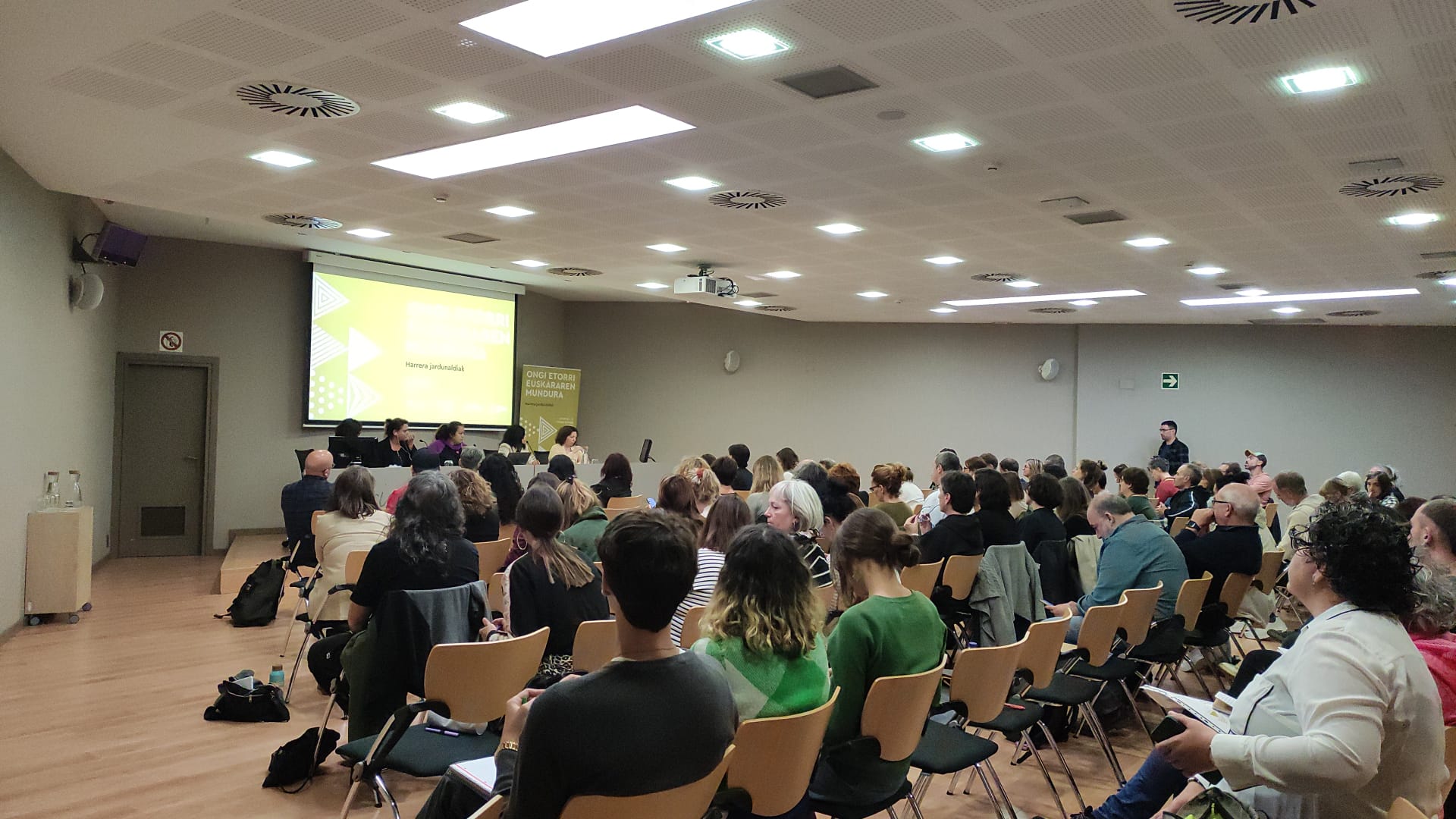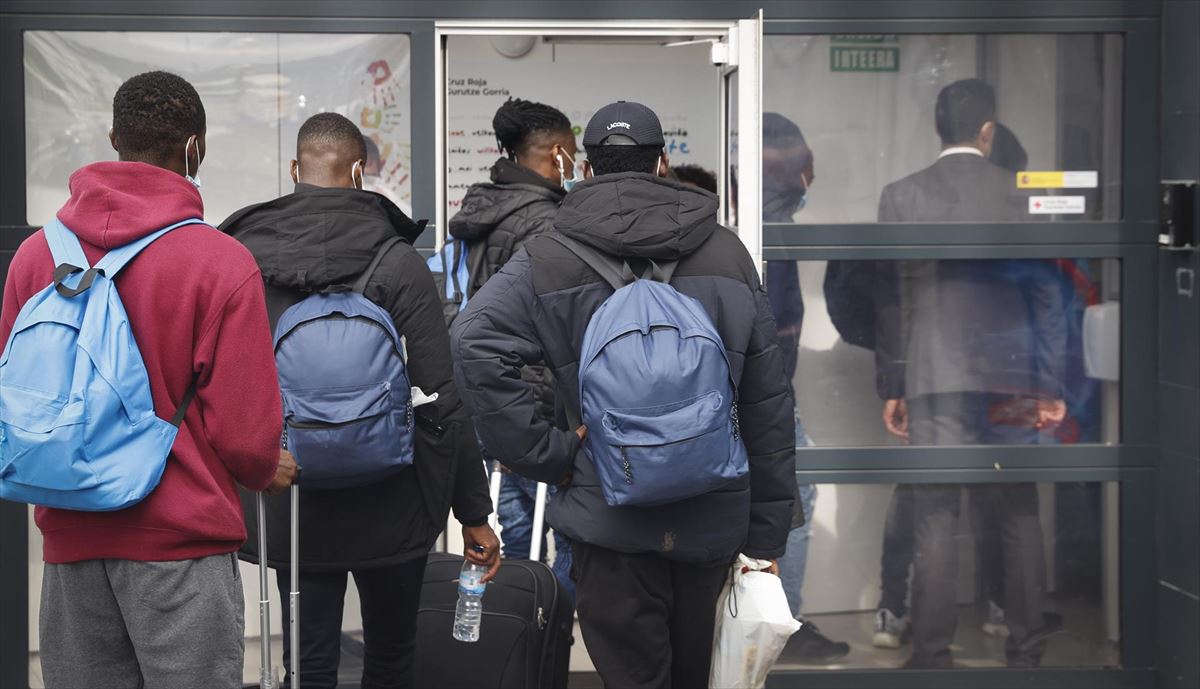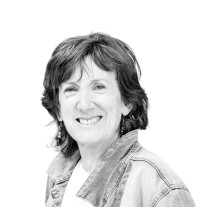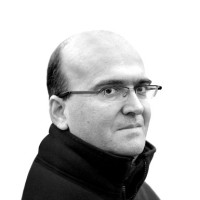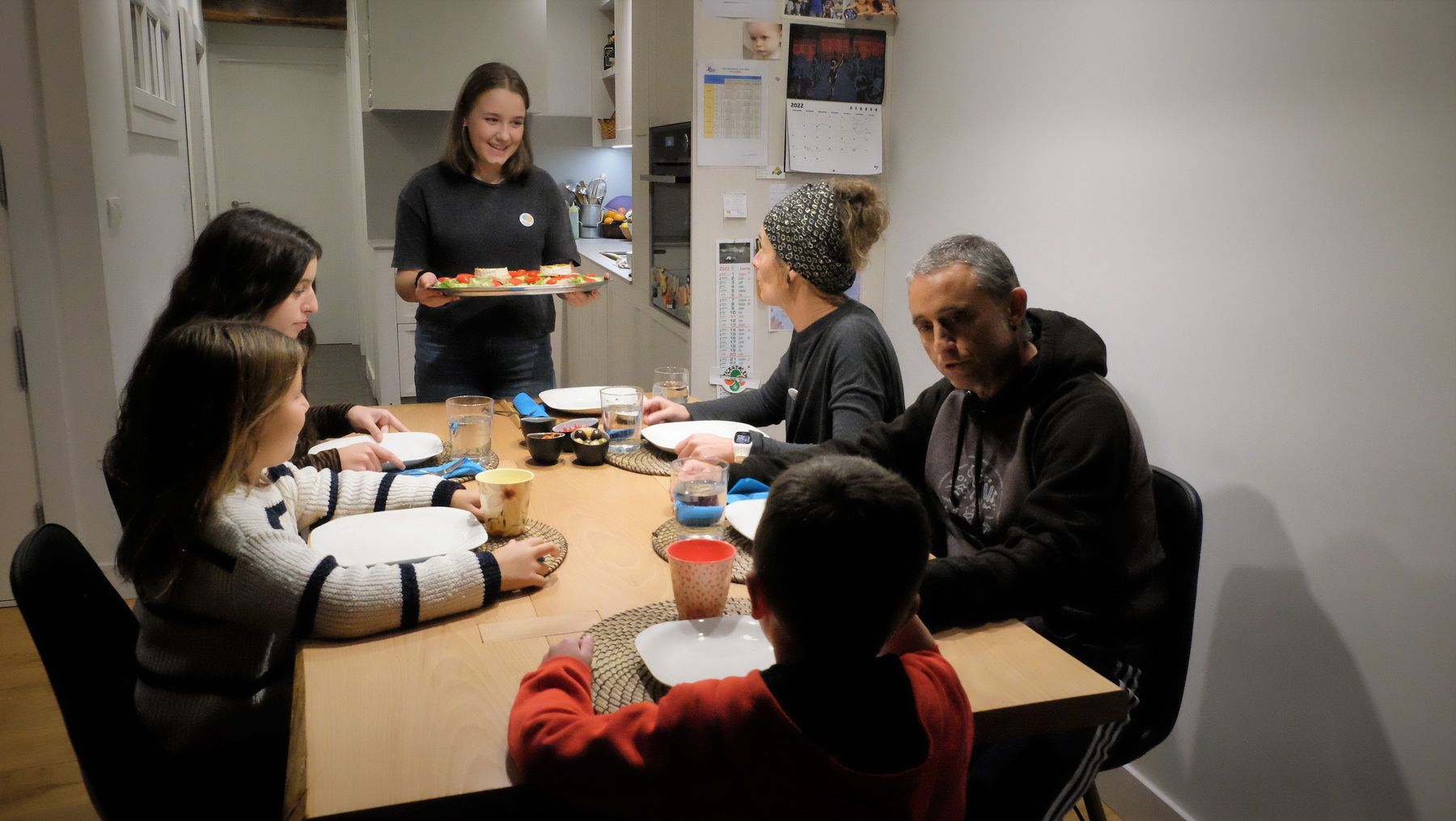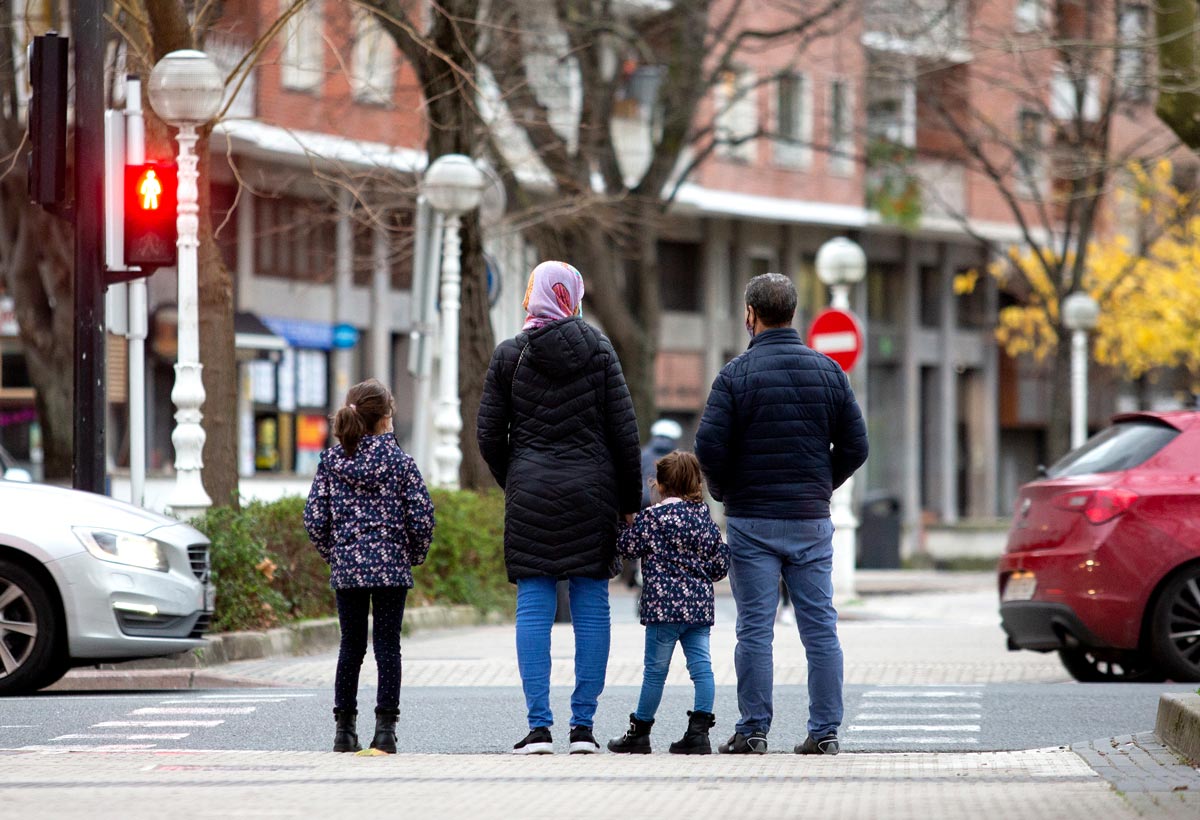Voluntary patches faced with institutional and social lethargy
- The journalist wanted to go to school and ask him how foreign children and young people manage to learn Basque. To see how the cuts in Education have affected resources, if they have a reception plan, if they work their native languages… “Reception plans?”, we were somewhat surprised by the Gasteiztarra father Ruben Sánchez Bakaikoa: “In a center where there are only white people, whom do they have to serve? And in the center where there are no white people, who has to receive them?” We have raised our eyes from the classroom and talked about the neighborhood, the people, marginalization, poverty, segregation and public institutions and society that shrink to take steps towards coexistence. This is what Leire Diaz of Gereñu says: “There is no Basque, if there is no coexistence.” We have approached Vitoria-Gasteiz and Hernani to learn about the joys and concerns of those who work against the current.

We have learned that in Hernani they help children with foreign parents and newcomers to do housework. We wanted to know the work they are doing and we met with the actors involved in the project: Amher-Sos Racism (Hernani Multicultural Association), Kaxkardi Kirol Elkartea, municipal language and education technician (Malores Etxeberria), interculturality technician (Irantzu Jauregi) and director of the Ikastola Elizatxo (Gurenda Elu). They've told us a lot more than they help them do their homework.
Thomas Elortza is one of Amher’s veteran volunteers and it has been recalled how a dozen years ago, for the first time, he taught a summer to two Moroccan brothers. They didn't know Euskera or Castilian, they had everything to learn. Since then, for several years, the Amher Association has coordinated support for domestic tasks through volunteers. However, the number increased and there began to be problems in meeting demand.
Since that time, about fifteen years ago, all the schools in the town meet around the City Hall, from the Children's School to the Vocational Training and the Baccalaureate. The directors of the nine colleges meet once a month. Topics such as education, the Basque country, the environment, equality, culture, etc. are addressed and coordinated in this forum. In addition to the schools and the city hall, social movements of the town also participate when the subject requires it, such as Amher, the education platform, free time groups and associations of the Basque Country.
Leire Diaz de Gereñu, mother of Ramón Bajo school:
“The Basque language is a minority language, we want to survive, and this generates a tendency to gather together among us, especially in the socio-linguistic Castilian and Parasitic spheres, but that is not a society, and with the excuse of the Basque one other issues could be concealed”
It is precisely in this forum that some fifteen years ago we started talking about the schooling of immigrants and felt the need to address this issue. The newly arrived students were concentrating on a certain school, the concerted Christian, and the concentration was increasing. Three out of four students were immigrants at school, and in the rest, all public, there were hardly any immigrant students. The City Council technicians, Etxeberria and Jauregi, say that a situation like this was not the right one for the people, and that there were all the reasons to address the issue. They tried to escape, but they couldn't get through. The situation for schools was not yet very uncomfortable. The immigrant was a source of enrollment for the school he was receiving, he needed it and, in a way, with the means at his disposal he managed the situation. For the rest of the schools, one concern less. Meetings were held with the Department of Education of the Basque Government, as the Basque Government also had Hernani among the municipalities to work. The Department of Education and the City Hall of Hernani made a diagnosis, but in practice they did not reach anything.
The distribution of students is not proportional
It has rained a lot since then. We have suffered an economic and financial crisis, the Department of Education began to cut into schools, and immigrants have continued to come more than before. Decrease in the native birth rate and continuous displacement of foreigners. Jauregi says that this reality has come to stay and that other agents have also realised it.
Thus, two years ago, in the forum where the directors of the educational centers and municipal representatives meet, it was thought to better know the school reality of the children of foreigners. The situation worsened in those years: the concerted centre could no longer manage the number of foreigners and the same was already happening in another public centre. Given the feeling that the situation was not good for anyone, they decided to start working somewhere.

By then, the Amher association had already taken several paths. The Hernani City Hall participatively decides how to spend part of the budget, 500,000 euros a year. The Amher project was presented to help children from foreign families in domestic work. They couldn't help every child on housework, they were getting more and more. They wanted the City Hall to get involved. The neighbors approved the Amher project in the participatory budgets. The City Hall hired the Kaxkardi Sports Society for this work. A number of objectives were pursued with this change: Amher relieved and increased the number of pupils, the children have as a reference to be younger teachers and it is very important, in addition to doing household chores, that the young educators of Kaxkardi immerse themselves more easily in the leisure of the people.
40 children helping in household chores
Her colleagues in Amher have provided free help to many children in household chores and now she also has students that Kaxkardi has not taken on. The City Hall has taken over the economic activity of the puppies. The Kaxcardiacs have started the fourth course. They're 8 to 11 years old. It is about 40 children and each class has a maximum of ten children. They go to the five centres and the children are chosen by the teachers according to their needs. The classes are aimed at both foreigners and foreign children. The interlocutors are concerned about this issue. The Castilian and Spanish parents and Euskera speakers also have children who do not perform well in school and who lack financial resources. They have no place in this project. In any case, Irantzu Jauregi pointed out that the boys and girls who meet in the project have two characteristics: one, that their parents do not have the economic resources to collaborate in the academic way and the other, that they have come to a very strange reality and that in most cases they do not have a network of relations in the village.
Every three months, Kaxkardi educators meet with the head of the child’s studies and follow up. At the beginning of the course, the teacher will inform Kaxcardiko of the needs of the child. Some do not master Euskera or Castilian, so with them they deepen the language; others have problems of understanding and work in reading; there are others who do not have problems with languages, but for example, those who are stuck in mathematics and at home cannot help them because they do not know the language. For the following day, they also go home without work and, in this case, perform games and exercises to work together and practice the Basque.
One objective is to advance academically, but the project goes beyond, to master the Basque country from domestic tasks. Kaxkardi is playing football with boys, in piragua, in the summer colonies, and they know a lot of children in the village. They want to bridge, open the way to foreign children for leisure in the village.
We asked Gurenda Elu how they take their children to be run by another group outside the center, if the centers don't feel other agents involved. She firmly says no. “We have relaxed. We have a responsibility, but we are not prepared to manage this reality. Sharing the students with Amher, the associations of the people and the city council is a shared responsibility.”
In the nineteenth month, they are no longer immigrants.
They have told us what they are doing and reminded us that many are doing because what they should do does not. Although this conversation has not paid particular attention to the Department of Education, it has come out from time to time. Irantzu Jauregi Kaxkardi reflects on two functions (academic and coexistence): “If the Department of Education provided resources to help the newcomer master the language, there would be no need for Kaxkardi’s first task. How are you going to follow up properly at school if you don’t know the same language?” That is, forces and money would be invested in relating to the people, in working on inclusion. They have recalled that in eighteen months, in the eyes of the Department of Education, the child ceases to be an immigrant. The Department makes available resources for this child during two school years and it is taken into account that during this period it will take the rhythm of the school. Kaxkardi members know what they're talking about. “There are children who have difficulties in school, how will they manage in Basque and often in Spanish, who do not know? And language is not the origin and solution of all the difficulties. We have very smart children, but they are out of place, in every way, they are newcomers from abroad.” They take the example of the Uzbek student and remember that for two years they have not had a translator in the schools, due to the cuts. In schools they have Mongols and Moroccans, who do not have either the Basque or the Spanish. You have to find the translator out of school. The two middle-aged young people have had a desperate smile: “You have 30 kids in class and you don’t understand anything. Aupa teacher!”
Gurenda Elu, Director of Elizatxo Ikastola: “We have relaxed. We have a responsibility, but we are not prepared to manage this reality. Sharing the students with Amher, the associations of the people and the city council is a shared responsibility”
Dobera and Kanika also work
We have not been the interlocutors at the table, but the members of the Basque association Dobera and the free time group Kanika are also mixing the Basque with the immigrants. The Hamaika batuaz project will bring together over a hundred children and young people in their free time. They are from Primary and Secondary Education. The goal is to help those who do not dominate the Basque Country along that road, out of school and through play. Most of them are immigrants.
Canika monitors meet every month to carry out activities with a hundred young boys and girls from the village. They make plans to sleep outdoors every three months. They are limited in number, but they always receive children in special situations, for example, newcomers. One of the pillars of the group is the Basque and the reception they receive the child; they value the language and culture that they bring from home and also explain the one here. Both the monitors and the children themselves take responsibility for helping the newcomer learn Basque. It is common to use mime or translate words into the ear in Basque whispered.
They're not pending from the Department of Education.
The interlocutors do not want to be taken as a model of anything, they say they are building their puzzle as possible. The duties of children have been a good excuse for all schools and different public and private actors of the people to join the initiative. They want to go ahead, knowing that they're just patching. The aim is to strike a balance between all educational establishments, that foreigners move to one or another centre, and that they do not accumulate. They trust that they don't know very well what balancing is. The journalist has wondered whether they are not the responsibility of the Department of Education, Universities and Research of the Basque Government. The interlocutors reply that they are not waiting for the Department of Education, but should wait. This does not mean that they are not working with the public entity. The first step they want to take with the children who arrive in the town outside the enrollment period, it's 30-35 a year. Consideration is being given to the establishment of an advisory commission so that each child can be transferred to which centre and communicated to the Department of Education. They are clear that if the Department does not act in the same direction, they will not be able to move forward in the people, because the Department has the last word. It would only be a starting point to guide children who come out of time, in a short time many things have occurred to them for the future: getting translators, asking newcomers about their language and their culture, making a full reception plan in the village…
Gurenda Elu wishes to underline the role of the people: “We knew that the school alone couldn’t. We add the family and we are now adding the people. Amher, Kaxkardi, Dobera, Kanika… With all of them by our side we are quiet.”
In Vitoria-Gasteiz, in the Casco Viejo, trying to revitalize the neighborhood
In Vitoria-Gasteiz we met with four neighbours and neighbours: With Ruben Sánchez Bakaikoa and Leire Diaz de Gereñu, parents of Ramón Bajo College, and with Natasha Rueda and Salka Mint Karam, of the Goian association. At Ramón Bajo School in the Casco Viejo, we wanted to know what migrants and the Basque people are doing. We have soon realised that the limitation to the centre makes no sense. The four interlocutors have placed the neighborhood in the center of the city and the educational project Goian Alde Zaharra as imprescindible.Hace about fourteen years the parent association of
Ramón Bajo College founded Goian, although he later received that name. The Free Time Association was created by the parents who tried to change model A to model D and balance the school into the ghetto of foreigners. A great deal has been done since then. Goiane is characterized by close ties with the neighborhood. Five educational criteria are worked in all groups: Basque, participation, co-education, mutual care and diversity. It is located in a neighbourhood with special features. Casco Viejo has a great stigma, it is considered an aged neighborhood full of struggle and immigrants. It also begins to suffer gentrification, as tourists and speakers are making a hole in the area. Therefore, two objectives, taking the Basque language as the axis, how can we keep the neighborhood alive and keep the neighbors of so many backgrounds living together?

They have two main objectives, but each day they have to make adaptations. How to ensure that Euskera is a language of communication? The reality of the neighborhood is very complex and to better explain the role of Goiane, Sánchez has given an example: “With the children Tau takes great care of himself as a monitor, but they have not taught him Euskera. I also want my children to participate in these activities in Euskera, but with Tau you can't. But I don't want to leave Tau out. How do we do that?”
The Goian Association brings together children and young people of all ages. Most are neighbors, but anyone from Vitoria-Gasteiz can enroll. They are students of model D and model A. Educators are not always Euskaldunes, as Sánchez said. They fix themselves as they can: if the educator does not know Euskera, the assistant may or may not know, but start to introduce words into Euskera. On other occasions, it is the children themselves who do not understand Basque. However, the ignorance of the Basque Country does not close its doors either to the educators or to the children. They also have adult activities. For example, the Sukaldean solasean initiative is successful. It used to be in Spanish. Today the one who makes the recipe explains it in his language and also tells it in Basque. They decided to give yoga in Basque. They also have the Auzo program offered by Topagunea, which has been named the Inter-Language Meeting. Children and not so young, celebrate carnivals, the Olentzero and other special calendar dates.
The Goian association is subsidized by the city council. However, because of their needs, they organize activities to raise money. Each action has a fee of EUR 40 per year to make it accessible to all and all people who are unable to pay the share are eligible for collaborative scholarships. The Association brings together street educators, AMPA, a professor of Ramón Bajo, volunteers and educators.

There will be no experiments in the Ramón Bajo school.
The two parents are working very happy in the neighborhood, but both are pessimistic. Leire Diaz de Gereñu stressed that neither the Department of Education nor society itself express a real will to promote coexistence through the school: “Segregation is said to have to be avoided, but there are no common goals. It is not enough for the centre to have model D. This does not mean that it will advance in coexistence, that it will advance in the Basque country, among other things, by segregation. There have been many changes over the last twenty years and the issue has not been addressed in sufficient seriousness in education. In an educational system such as ours, in which language is the main axis, special care must be taken, for example, in the reception plans for migrants and in situations of emergency. On the other hand, the school community is also the responsibility of all of us who are part of it. Emphasis is placed on the need to bring Basque closer to immigrants. This is not the case, first of all, the road is to get closer and to live together.”
Sánchez is also not waiting for what the Department of Education does, but has focused on society, does not believe that anything similar to what happened with Ramón Bajón in the Basque Country happens: that the parents of the center bring their children to the center ghetto to to somehow balance the center: “Parents have to put their children in the front line to do such a thing. The ikastolas had a lot of that: they sent the children to the ikastolas that were illegal. Are people ready to do this kind of wagering today?” And therefore, if there is no intervention from public institutions, classes will be distinguished from what is not white and what is white, from what is poor and not so poor. Sanchez says sadly: “How do Euskera work with immigrants? In our whatsapp, messages that this family will be homeless next week are common.” Díaz de Gereñu insists that there is no political will to deal with poverty and marginalization, but that it is also up to society to call for change, to call for the disappearance of segregated centers and that it does not.
They do not want immigrants to be blamed for the evils of the Basque Country, as there is a great tendency to do so. Diaz de Gereñu makes the following reflection: “All right, the Basque language is a minority language, we want to survive, and this generates a tendency to gather together among us, especially in the socio-linguistic Castilian parishioners, but that is not a society, and with the excuse of the Basque language other issues could be concealed. We will have to think about how we will strengthen the Basque country. The conditions we already have are there, and in addition, the hegemony of English is spreading, but the problem is not the other.”
Natasha Rueda, member of the Goian association
"Now I want to learn Basque"

I'm Colombian and I came to Euskal Herria when I was 15 years old. In school, I was placed in the first year of high school. In the first class of Euskera, with the book in hand, I went to ask a question to the professor, and he told me that I had no time for myself, because I had the Basque exempt and another 34 students were waiting for him. If I wanted to try, and if not, go to the yard. If you answer me like that, I don't want to be here, I go to the yard.
I have not wanted to learn Basque. Should we learn Basque, yes or yes? And let us not forget what money it takes to learn Basque. Now I want to learn Basque. I've been working in Euskaltegi for three years. I've been teaching urban dance for five years in the partnership. I want to learn Basque because I am in Goiane, because of the importance that Goiane has in my life.
Many young people have had bad experiences like mine. In High School they have been exempted from the Basque Country and at the end of the Baccalaureate they suddenly realize that to pass the Baccalaureate they have to pass the Basque exam to prove a certain level. They feel that the Basque country is going to damage their academic trajectory and their vital aspirations. They feel compelled to learn Basque.
Above is different. Euskera is the axis, we want to do it in Euskera, but we accept anyone and take into account the situation of what is coming. It shall be expressed in Basque wherever possible and as far as possible. You will start slowly, word by word, you will hear Basque, you may be encouraged to receive Basque classes next year, or you are an educator and start counting in Basque with the children. I, for example, only use verbs in command mode when I talk to children. Again, a child told me that he had improved a lot. How did you realize it! At first I did not understand anything, now I understand almost everything. Many children no longer speak to me in Spanish. If I do not understand it, I ask you. They've also realized that I'm changing.
.jpg)
Salka Mint Karame, member of the Goian association
"In Goian I do nothing in Basque"
I'm 17 years old. I was born in Tenerife and at 4 years old I came to Euskal Herria. I lived in Iurreta and Bilbao and in both I studied in model D. When I came to Vitoria, my mother included me in model B, if I couldn't help myself in housework. So I started to lose Euskera. I didn't finish high school and I went to Adult Education. We spent an hour a week in Basque. I am studying as a nursing assistant, in Spanish, because in Basque it is very difficult. In Euskaraz I only do it in the Goian association. I help the monitor in educational games. I do Basque with children.
Euskalgintzaren Kontseiluak antolatutako "Ongi etorri Euskararen Mundura" jardunaldiak izan dira Gasteizen ostegunean eta ostiralean. Egun bi bete-beteak, eta mahai gainean Euskararen normalizazio prozesuan euskal herritar berriak integratzeari buruzko praktikak... [+]
Among many falls, there are also achievements. A young mother of about 35 years old asked me the other day how they could get in their school that the classmates who had not received Euskera at home learn and speak as well as the boys and girls who were Euskaldunes at home. In... [+]
“How are you?”
“Bad, bad. Subject to machine.
“You’ll turn it around because you’re tough.
I don't know. Now I don't know.
This was the last interview with his American uncle. He was a pastor to Nevada, where he founded his family, his new life. They have come from... [+]
UEMA, the Commonwealth of Basque Municipalities, presented to the media last month a campaign under the motto Egin nirekin euskaraz. Families have emerged that do not originate in the Basque Country, along with representatives of UEMA. They say that we Euskaldunes often approach... [+]
We learned by publishing the results of the last sociolinguistic survey of the Basque Country in Navarra: Since 2011, the Foral Community has strengthened its attitude against the promotion of the use of Euskera and weakened the most favorable. In Basque Country, seeing people... [+]









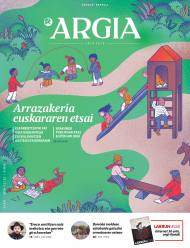

.jpg)
